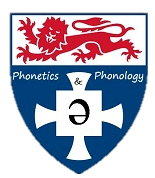-
News:
Accent Articulation Conference First Language Acquisition gamification Group focuses Job Laboratory Phonology Lecturer Linguistics Morphology Perception PhD Funding Phonetics Phonetics and Phonology Phonology Professor Project on Tyneside English Psycholinguistics R Research associate science open day Sociolinguistics Sociophonetics Speech Signal Analysis Speech signal processing statistics Workshop
Tag Archives: Accent
Think You Know Northeast Accents? Test Your Skills at the Discover Festival!
Ever thought you could pinpoint exactly where someone’s from in the Northeast just by hearing them talk? Well, we put that to the test at the Discover Festival on 7 June at the Great North Museum—and let’s just say, it was much harder than people expected! What … Continue reading
Unraveling the Mysteries of Domain-Initial Strengthening: Insights from Dr. Ricardo Napoleão de Souza’s Latest Research
For this week’s Prosody Interest Group (PIG), we are excited to invite Dr. Ricardo Napoleão de Souza from the University of Edinburgh to talk about his recent research. Focusing on “Domain-Initial Strengthening from an Acoustic Perspective,” Dr. de Souza presented … Continue reading
Posted in Group Focuses
Tagged Accent, Laboratory Phonology, Phonetics, Phonetics and Phonology
Leave a comment
A Resounding Success: Our Journey at ICPHS 2023
From August 7th to 11th, our research group embarked on an illuminating expedition to the 20th International Congress of the Phonetic Sciences (ICPHS) 2023. As one of the most significant congresses in the field of phonetics, the ICPHS is a … Continue reading
PoLaR Workshop with Byron Ahn: A Dive into Prosodic Analysis
On Tuesday, we were delighted to welcome Dr. Byron Ahn for an in-depth workshop on the use of PoLaR in analyzing prosodic features of speech. The three-hour session delved deep into the intricate layers of intonation. The workshop began by … Continue reading
Posted in Workshops
Tagged Accent, Laboratory Phonology, Phonetics and Phonology, Phonology
Leave a comment
Recent Workshop Recap
We are delighted to update our community on the successful completion of our recent workshop this Monday, titled “Training Your First ASR Model: An Introduction to ASR in Linguistic Research“. Workshop Overview:The workshop was designed to delve deep into the … Continue reading
Posted in Workshops
Tagged Accent, Phonetics, Phonetics and Phonology, Phonology, Sociophonetics
Leave a comment
Recap Semester 2 2021/2022
From January 2022 to May 2022, our research group has continued to be well-engaged in projects from Semester 1 and arranged new workshops to discuss topics of interest amongst our team members. The following is a summary of what we … Continue reading
Posted in Uncategorised
Tagged Accent, Phonetics, Phonetics and Phonology, Phonology, Sociolinguistics, Sociophonetics
Leave a comment
Accent and Social Justice Workshop
Our research theme for 2021/22 has been “Accent and Social Justice”. We have read and reviewed literature on accent processing and perception, and discussed the prejudices towards certain accents and the injustices those may experience. In order to spread awareness … Continue reading
Posted in Workshops
Tagged Accent, Phonetics, Phonetics and Phonology, Phonology, Sociolinguistics, Sociophonetics
Leave a comment
Recap Semester 1 2021/2022
From September 2021 to February 2022, our research group has been very active and involved in several projects. Here is a short summary of what we discussed during our weekly meetings: Accent and Social Justice: Within our research theme for … Continue reading
Posted in Workshops
Tagged Accent, Phonetics and Phonology, Sociolinguistics, Sociophonetics, statistics
Leave a comment

